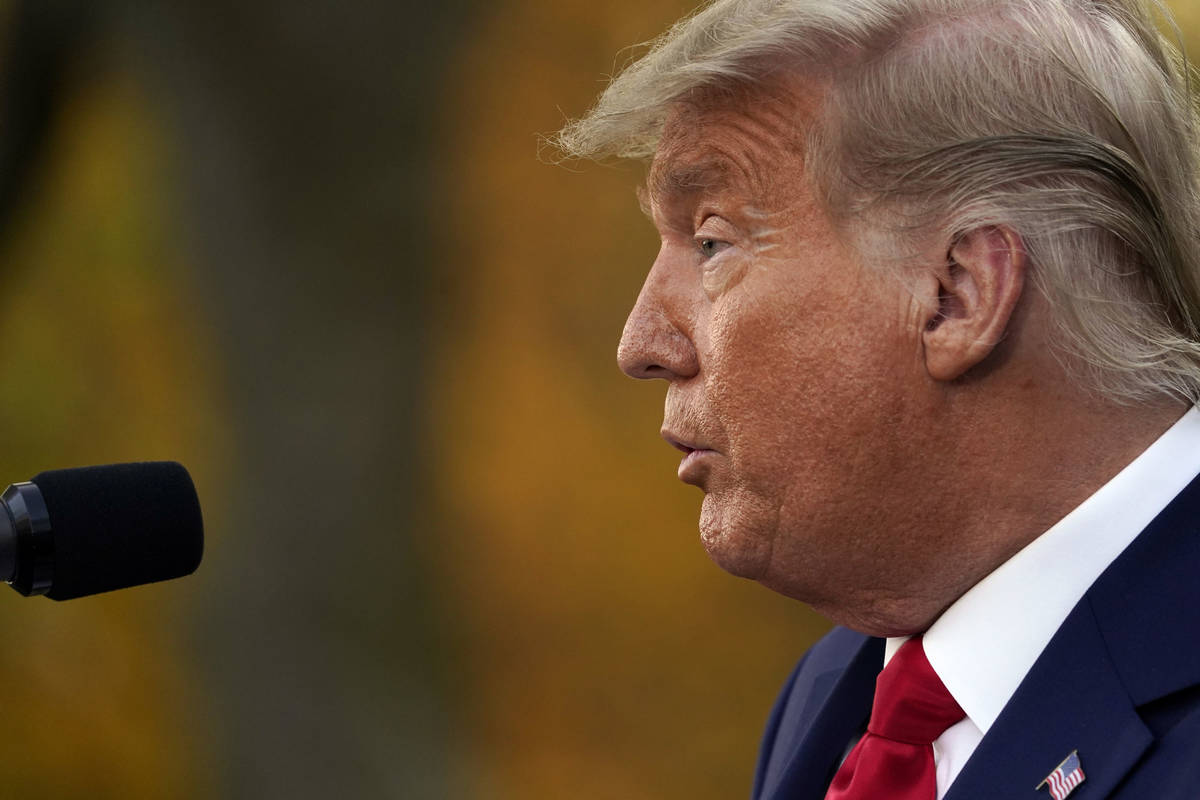Trump touts coronavirus vaccine at Rose Garden event

WASHINGTON — President Donald Trump took a bow Friday in the Rose Garden for the success of Operation Warp Speed, his initiative to flood the country with a coronavirus vaccine before the end of 2020, as he continued to refuse to concede to President-elect Joe Biden.
It was a bittersweet moment for Trump, who had hoped to announce an approved COVID-19 vaccine before the election.
But it was not until Monday, six days after the election, that Pfizer announced that its coronavirus vaccine under development with BioNTech had been found to be more than 90 percent effective. That announcement came ahead of an expected emergency-use application with the U.S. Food and Drug Administration.
On Twitter on Monday, Trump accused Pfizer and other big pharmaceutical concerns of waiting until after the election to announce good news, and he also without proof charged that the FDA “should have announced it earlier, not for political purposes, but for saving lives!”
Kathrin Jansen, Pfizer senior vice president and head of vaccine research and development, had told The New York Times, “We were never part of the Warp Speed. We have never taken any money from the U.S. government, or from anyone.”
But the Times reported that in July, Pfizer made a $1.95 billion deal with Operation Warp Speed to deliver 100 million doses of a vaccine, even if, unlike other big pharmaceutical rivals, Pfizer did not accept federal funds to develop the vaccine.
In March, when Trump announced his COVID-19 vaccine initiative, health care experts and even some members of the White House Coronavirus Task Force offered that they saw no path that would produce a federally-approved vaccine for a new virus in such record short order.
“The president is working diligently for the American’ people,” assistant White House press secretary Karoline Leavitt told the Review-Journal as she discussed his work on the coronavirus and other issues. “The narrative that he has given up on governing is false.”
Back in the limelight
Trump spent the week in the White House largely out of sight but chiming in on Twitter as he challenged the results of the Nov. 3 election. With little on his public schedule, Trump has spent hours huddled in meetings in the Oval Office as he has refused to concede the race.
The Rose Garden event Friday, which Trump called a press conference, fit with the president’s pattern of working to dominate the news cycle at week’s end even as he refused to take reporters’ questions about the outcome of the Nov. 3 election, which major news organizations have called for former Vice President Biden.
During a Thursday interview with the Washington Examiner’s Byron York, Trump laid out a scenario in which he wins Arizona, Georgia, North Carolina, Pennsylvania, Wisconsin and Michigan thanks to his campaign’s many lawsuits pushing for voting audits and recounts that would flip the vote in his favor.
The Associated Press called four of those states — Arizona, Pennsylvania, Michigan and Wisconsin — for Biden and has estimated that the Democratic nominee won at least 290 electoral votes, 20 more than the 270 needed to win the election. AP called North Carolina for Trump on Friday but has not made a projection for Georgia, where Biden leads.
Trump notably did not mention Nevada, where the Nevada GOP has alleged that “criminal voter fraud” skewed the ballot count to Biden’s advantage.
On Friday, however, the Trump campaign dropped a lawsuit that pushed for a recount of some ballots in Arizona, which made it even more unlikely Trump could upend his way to victory. Still, he has been reluctant to admit defeat.
On the same morning, White House trade adviser Peter Navarro said on Fox Business Network that the White House is working on the assumption there will be a second Trump term and that the Biden win is part of an “immaculate deception.”
Exit strategy
Washington’s new guessing game has whirled around whether and how Trump will exit the Oval Office.
During a discussion on the transition hosted by the University of Virginia’s Miller Center, former Homeland Security Secretary Michael Chertoff, who served under President George W. Bush, said he suspects that Trump will go to Mar-a-Lago for Christmas “and he may not come back to the White House. He may camp down there and create his own alternative White House.”
Asked whether Trump will leave the White House on his own, former Trump campaign adviser Sam Nunberg told the Review-Journal, “He was always going to go. Yes. Yes. Yes.”
Trump could run in 2024, Nunberg noted, or he could be the kingmaker with an endorsement of a Republican hopeful.
One White House staffer who wished not to be named told the Review-Journal that Trump will accept the results when the count is official in December.
The staffer also predicted that Trump would be a force in 2022, with a legacy that lives beyond Inauguration Day, Jan. 20: “Donald Trump is not going to go away for a very long time.”
Contact Debra J. Saunders at dsaunders@reviewjournal.com or 202-662-7391. Follow @DebraJSaunders on Twitter.